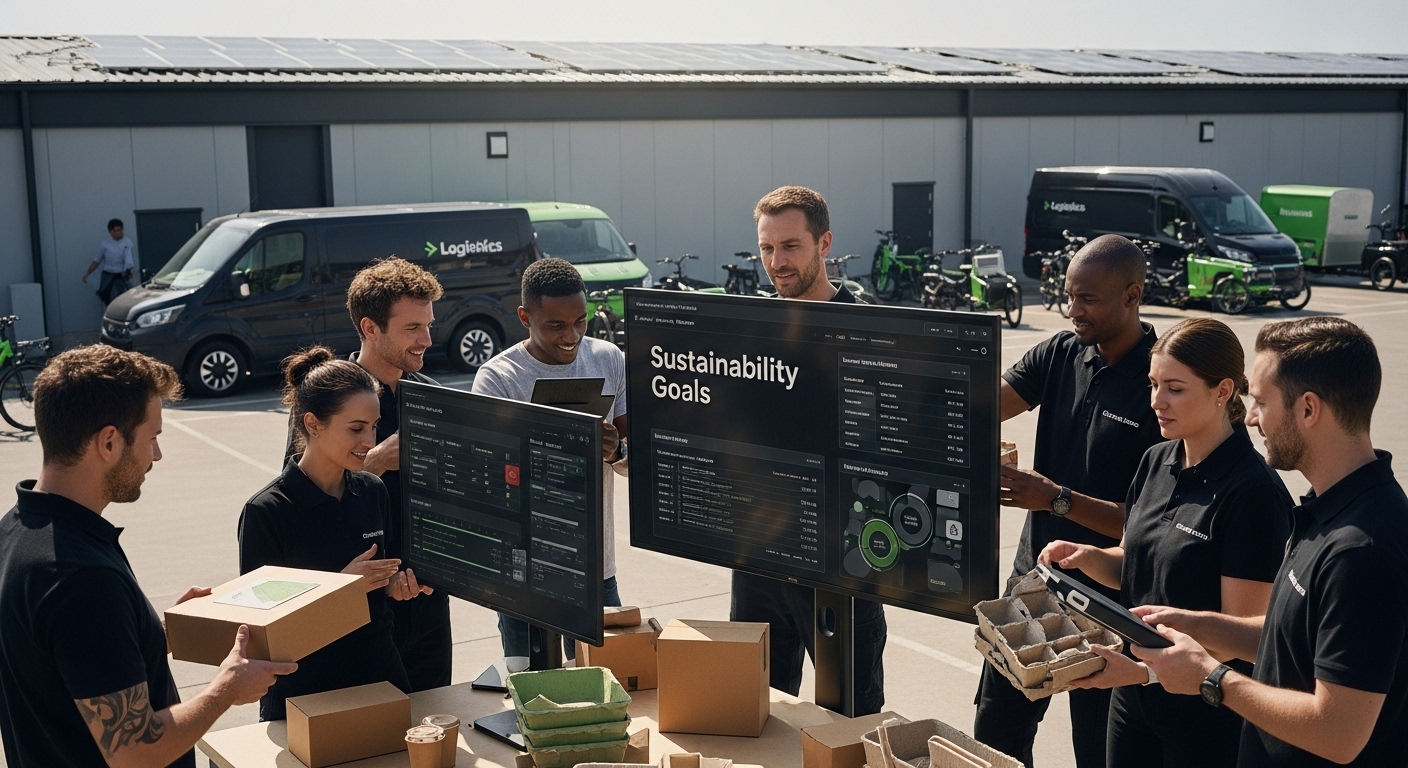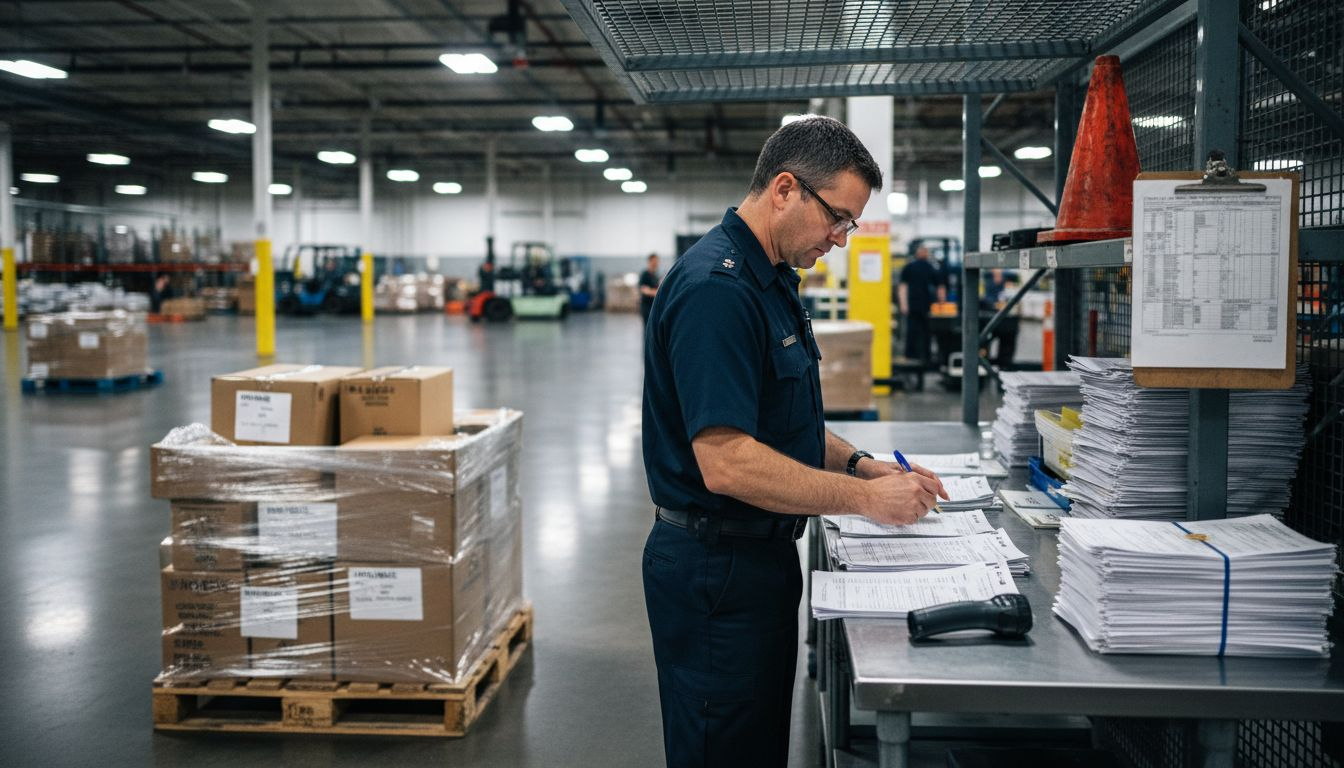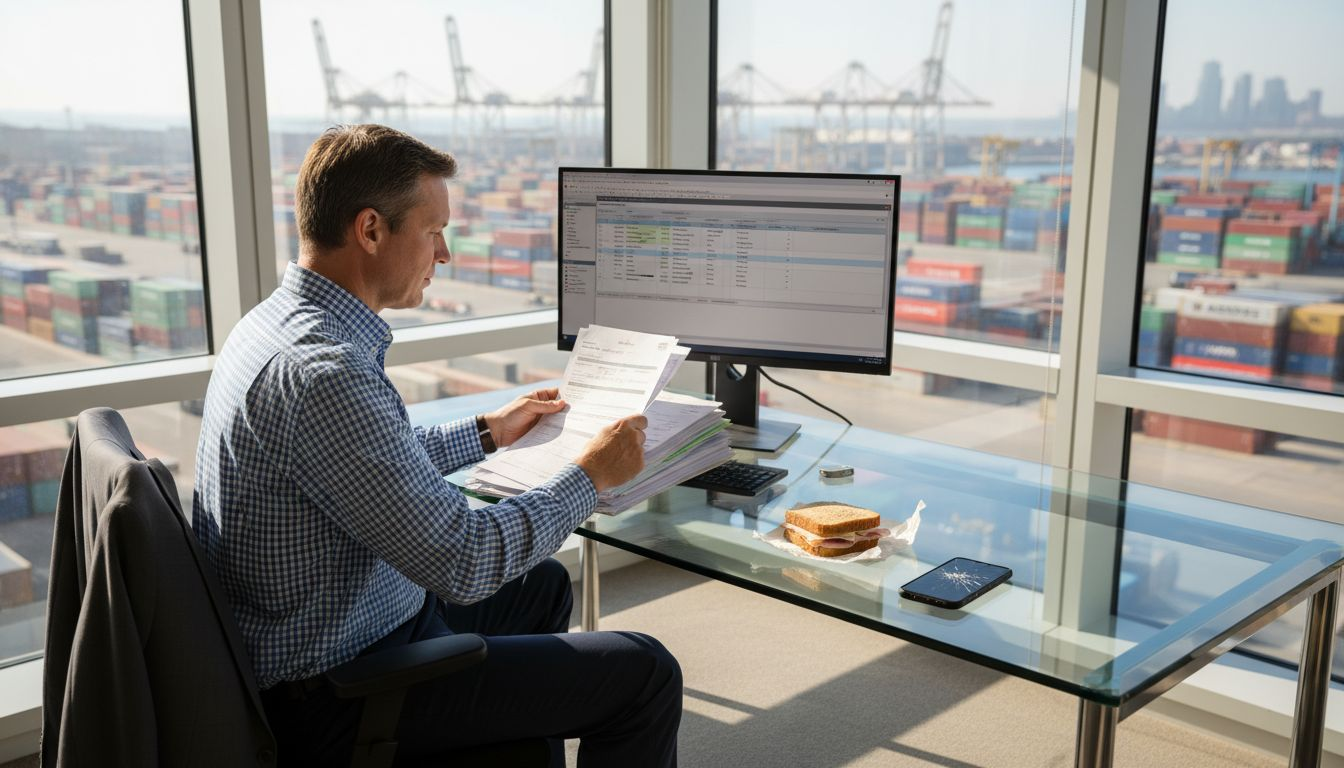Sustainability is quickly redefining how logistics companies operate across the globe. Transportation activities account for a huge share of global greenhouse gas emissions, according to the U.S. Environmental Protection Agency. Most people expect sustainability to slow down business or raise costs. Instead, the smartest companies are turning these challenges into new ways to innovate, save money, and build stronger reputations.
Table of Contents
- Defining Sustainability In Logistics: Concepts And Goals
- The Importance Of Sustainability In The Logistics Industry
- Key Practices Of Sustainable Logistics Operations
- Challenges And Opportunities In Implementing Sustainable Logistics
- Real-World Examples Of Sustainability In Logistics
Quick Summary
| Takeaway | Explanation |
|---|---|
| Integrate environmental, economic, and social goals. | Sustainable logistics balances these three dimensions for improved supply chain management. |
| Adopt advanced technologies for sustainability. | Utilize electric vehicles, real-time tracking, and route optimization to enhance operational efficiency. |
| Focus on collaborative logistics models. | Joint freight loading and shared infrastructure reduce costs and environmental impact. |
| Train workforce on sustainability practices. | Develop a knowledgeable team committed to environmental responsibility and innovation. |
| Prioritize compliance with evolving regulations. | Stay updated with sustainability laws to avoid penalties and enhance market competitiveness. |
Defining Sustainability in Logistics: Concepts and Goals
Sustainability in logistics represents a comprehensive approach to transforming supply chain operations by integrating environmental responsibility, economic efficiency, and social well-being. This strategic framework goes beyond traditional business practices, focusing on reducing environmental impact while maintaining operational effectiveness and creating long-term value.
The Core Dimensions of Logistics Sustainability
Sustainability in logistics encompasses three fundamental dimensions that work together to create holistic, responsible supply chain management.
 Learn more about logistic provider strategies that support these critical objectives:
Learn more about logistic provider strategies that support these critical objectives:
Environmental Dimension
This aspect concentrates on minimizing carbon emissions, reducing waste, optimizing resource consumption, and implementing green technologies. Key focus areas include:
- Reducing greenhouse gas emissions from transportation
- Implementing energy-efficient vehicles and equipment
- Developing circular economy principles in logistics operations
Economic Dimension
The economic component ensures that sustainable practices contribute to financial viability and long-term business success. This involves:
- Reducing operational costs through efficient resource management
- Investing in technologies that lower environmental impact
- Creating value through sustainable innovation
Social Dimension
The social aspect addresses human welfare, workplace conditions, community impact, and ethical practices throughout the supply chain. Critical considerations include:
Below is a table summarizing the three core dimensions of sustainability in logistics, detailing their primary focus and key activities in concise form.
| Dimension | Focus Area | Key Activities and Objectives |
|---|---|---|
| Environmental | Minimize environmental impact | Reduce emissions, lower waste, use green technologies, improve energy efficiency |
| Economic | Ensure financial viability | Lower operational costs, invest in efficient tech, create value through innovation |
| Social | Human welfare and ethical practices | Promote fair labor, support communities, enhance safety and workplace conditions |
- Ensuring fair labor practices
- Supporting local communities
- Promoting worker safety and well-being
Strategic Goals of Sustainable Logistics
According to the National Academies Press, sustainable logistics aims to balance ecological preservation, economic prosperity, and social equity. The primary strategic goals include:
- Minimizing environmental footprint across supply chain operations
- Developing resilient and adaptable logistics systems
- Promoting transparency and accountability in resource management
- Creating economic value while protecting ecological systems
- Supporting global sustainability targets and international environmental agreements
By integrating these comprehensive approaches, businesses can transform logistics from a traditional operational function into a dynamic, responsible, and forward-thinking strategic asset that contributes positively to global sustainability efforts.
The Importance of Sustainability in the Logistics Industry
Sustainability has transformed from a peripheral concept to a critical strategic imperative within the logistics industry. As global supply chains become increasingly complex and interconnected, businesses recognize that sustainable practices are no longer optional but essential for long-term success and planetary health.
Environmental and Economic Drivers
The logistics sector plays a pivotal role in global economic systems, simultaneously presenting significant environmental challenges and opportunities. According to research from the U.S. Environmental Protection Agency, transportation activities contribute substantially to global greenhouse gas emissions, making sustainability not just an ethical choice but a business necessity.
Key Environmental Impact Areas
- Carbon emissions from transportation vehicles
- Energy consumption in warehousing and distribution
- Waste generation from packaging and logistics operations
- Resource depletion through inefficient supply chain practices
Strategic Business Benefits
Adopting sustainable logistics practices offers multifaceted advantages that extend beyond environmental preservation. Learn more about cargo freight forwarding strategies that incorporate sustainability principles:
Economic Advantages
- Reduced operational costs through efficiency
- Enhanced brand reputation and customer loyalty
- Compliance with emerging environmental regulations
- Access to new markets and environmentally conscious consumers
Competitive Advantage and Future Readiness
Businesses that prioritize sustainability in logistics are positioning themselves as forward-thinking organizations capable of navigating increasingly complex global challenges. Sustainable practices enable companies to:
- Mitigate risks associated with climate change
- Develop more resilient and adaptable supply chains
- Attract top talent interested in working for environmentally responsible organizations
- Prepare for potential future regulatory requirements
By integrating sustainable practices, logistics companies can transform potential environmental challenges into opportunities for innovation, efficiency, and long-term growth. The future of logistics is not just about moving goods efficiently, but doing so with minimal environmental impact and maximum social responsibility.
Key Practices of Sustainable Logistics Operations
Sustainable logistics operations represent a comprehensive approach to transforming traditional supply chain management through strategic environmental, economic, and social interventions. These practices go beyond simple compliance, focusing on holistic optimization of resources, technologies, and operational processes.
Technological and Infrastructure Innovations
Advanced technologies play a crucial role in driving sustainable logistics practices. Explore our freight forwarding strategies that integrate cutting-edge sustainability solutions:
Technological Solutions
-
Implementing electric and hybrid transportation vehicles
-
Utilizing advanced route optimization software
-
Adopting real-time tracking and monitoring systems
-
Integrating artificial intelligence for predictive logistics management
According to the Logistics Operational Guide, implementing Environmental Management Systems (EMS) provides a structured framework for identifying, controlling, and minimizing environmental impacts throughout logistics operations.
Operational Efficiency and Resource Management
Key Optimization Strategies
- Maximizing vehicle load capacity
- Implementing reverse logistics and circular economy principles
- Reducing packaging waste through innovative design
- Consolidating shipments to minimize transportation emissions
- Developing multi modal transportation networks
Sustainable Workforce and Organizational Culture
Sustainability in logistics extends beyond technological solutions to encompass human capital and organizational practices. Critical considerations include:
- Training employees in sustainable practices
- Creating incentive structures that reward environmental performance
- Developing transparent reporting mechanisms
- Promoting a culture of continuous improvement and environmental responsibility
By integrating these comprehensive practices, logistics organizations can transform their operations from traditional models to dynamic, environmentally responsible systems that balance economic performance with ecological stewardship.
 The future of logistics lies not just in moving goods efficiently, but in doing so with minimal environmental impact and maximum social value.
The future of logistics lies not just in moving goods efficiently, but in doing so with minimal environmental impact and maximum social value.
Challenges and Opportunities in Implementing Sustainable Logistics
Implementing sustainable logistics represents a complex journey involving strategic transformation, technological innovation, and organizational adaptation. While the potential benefits are substantial, businesses encounter significant challenges that require sophisticated solutions and strategic planning.
Technological and Investment Barriers
Financial and Technological Challenges
- High initial investment costs for sustainable technologies
- Complex technological integration requirements
- Limited technological infrastructure in some regions
- Skills and knowledge gaps in emerging sustainable technologies
According to systematic research on Industry 4.0 technologies, organizations face substantial challenges in implementing advanced sustainable logistics solutions, particularly regarding technological complexity and investment requirements.
Regulatory and Compliance Landscape
Read more about freight rate negotiation considerations that impact sustainable logistics implementation:
Regulatory Complexity
- Evolving environmental regulations
- Inconsistent international sustainability standards
- Increased compliance monitoring and reporting requirements
- Potential financial penalties for non compliance
Strategic Transformation Opportunities
Emerging Opportunities
- Development of innovative sustainable technologies
- Creating competitive advantages through environmental leadership
- Attracting environmentally conscious customers and investors
- Potential cost savings through efficiency improvements
- Building resilient and adaptable supply chain networks
Successful sustainable logistics implementation requires a holistic approach that balances technological innovation, strategic investment, regulatory compliance, and organizational culture transformation. Companies that view these challenges as opportunities for innovation and differentiation will be better positioned to thrive in an increasingly environmentally conscious global marketplace.
The following table compares major challenges and opportunities for companies implementing sustainable logistics, helping clarify the complex factors businesses must weigh.
| Aspect | Examples and Details |
|---|---|
| Challenges | High technology costs, integration complexity, limited infrastructure, regulatory changes, skills gaps |
| Opportunities | New innovations, competitive edge, appealing to green customers, efficiency savings, supply chain resilience |
Real-World Examples of Sustainability in Logistics
Real-world implementation of sustainable logistics practices demonstrates the transformative potential of environmental strategies across various industries. These practical examples illustrate how innovative approaches can simultaneously reduce environmental impact and create economic value.
Transportation Network Optimization
Learn more about our freight forwarding strategies that support sustainable transportation solutions:
Successful Modal Shift Strategies
- Ocean Spray’s transportation network redesign
- Shifting from road to rail transport
- Implementing multimodal transportation networks
- Utilizing advanced route optimization technologies
According to research from the MIT Center for Transportation & Logistics, Ocean Spray successfully reduced transportation CO2 emissions by 20% through strategic distribution network redesign, showcasing the significant environmental benefits of intelligent logistics planning.
Collaborative Logistics and Shared Infrastructure
Innovative Collaboration Models
- Joint freight loading between companies
- Shared distribution center infrastructure
- Co-loading initiatives to reduce vehicle emissions
- Integrated supply chain partnerships
Companies like Colgate and Kimberly-Clark have demonstrated the effectiveness of collaborative logistics by co-loading freight to retailers, significantly reducing the number of trucks on the road and minimizing overall environmental impact.
Advanced Technological Implementations
Technological Sustainability Solutions
- Incorporating topographical route planning
- Using AI for predictive logistics management
- Implementing real-time emission tracking systems
- Developing electric and hybrid transportation vehicles
MIT’s Sustainable Supply Chain Lab highlighted how considering terrain in delivery route planning can achieve approximately 5% fuel savings per route, demonstrating the potential of data-driven sustainability strategies.
These real-world examples underscore the critical role of innovation, collaboration, and technological advancement in creating sustainable logistics ecosystems. By embracing these approaches, companies can simultaneously address environmental challenges and create competitive advantages in an increasingly sustainability-focused global marketplace.
Ready to Make Sustainability a Strategic Advantage in Your Supply Chain?
Are rising environmental demands and complex compliance requirements leaving your logistics plans feeling outdated or vulnerable? This article highlights how reducing carbon emissions, optimizing resources, and meeting new social expectations is no longer optional for global businesses. You want resilient, efficient, and accountable logistics. Discover how Worldwide Express, Inc. transforms these challenges into opportunity through tailored international shipping solutions and end-to-end supply chain management. For additional perspectives from our sector, visit our Uncategorized category page.

Take control of your sustainable logistics journey with a team that combines global reach, advanced technology, and proven expertise. Learn how our solutions in customs brokerage, international freight forwarding, and compliance can help your business thrive and protect the planet. Find out how you can lead on sustainability—connect with us today at Worldwide Express, Inc. and move your supply chain into the future.
Frequently Asked Questions
What are the main dimensions of sustainability in logistics?
Sustainability in logistics encompasses three core dimensions: the environmental dimension, which focuses on minimizing carbon emissions and waste; the economic dimension, which ensures financial viability through efficient resource management; and the social dimension, which addresses human welfare and ethical practices within the supply chain.
How can companies implement sustainable logistics practices?
Companies can implement sustainable logistics by using advanced technologies such as electric vehicles, optimizing routes, maximizing load capacities, reducing packaging waste, and training employees on sustainable practices. These approaches help minimize environmental impact while improving operational efficiency.
What are the benefits of adopting sustainable logistics?
The benefits of adopting sustainable logistics include reduced operational costs, enhanced brand reputation, compliance with regulations, access to new markets, and the ability to attract environmentally conscious consumers. These practices can lead to a long-term competitive advantage in the logistics industry.
What challenges do companies face when implementing sustainable logistics?
Companies may encounter challenges such as high initial investment costs for sustainable technologies, complex regulatory compliance, and limited technological infrastructure in certain regions. Addressing these challenges requires strategic planning and investment in innovative solutions.






